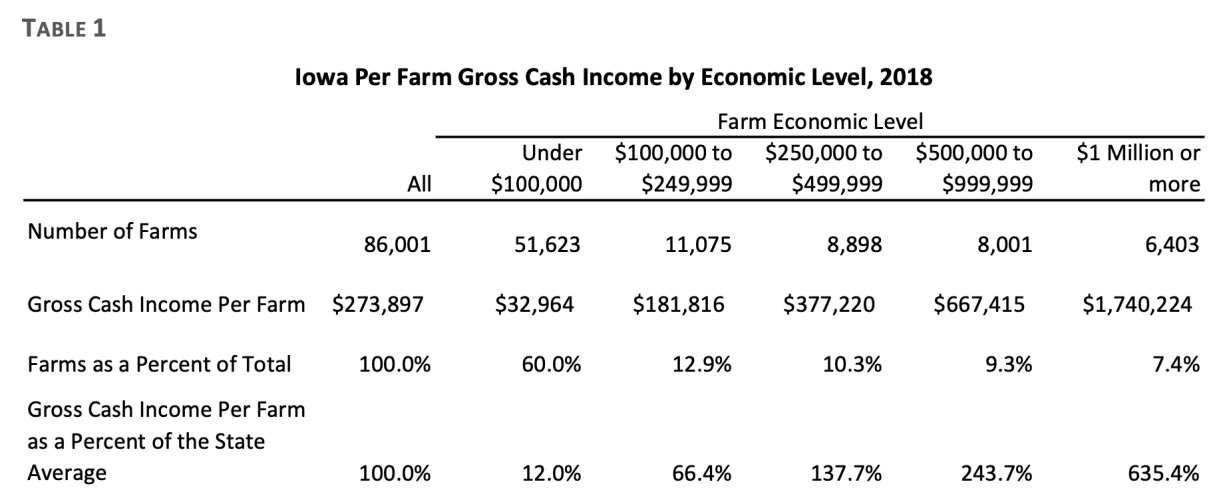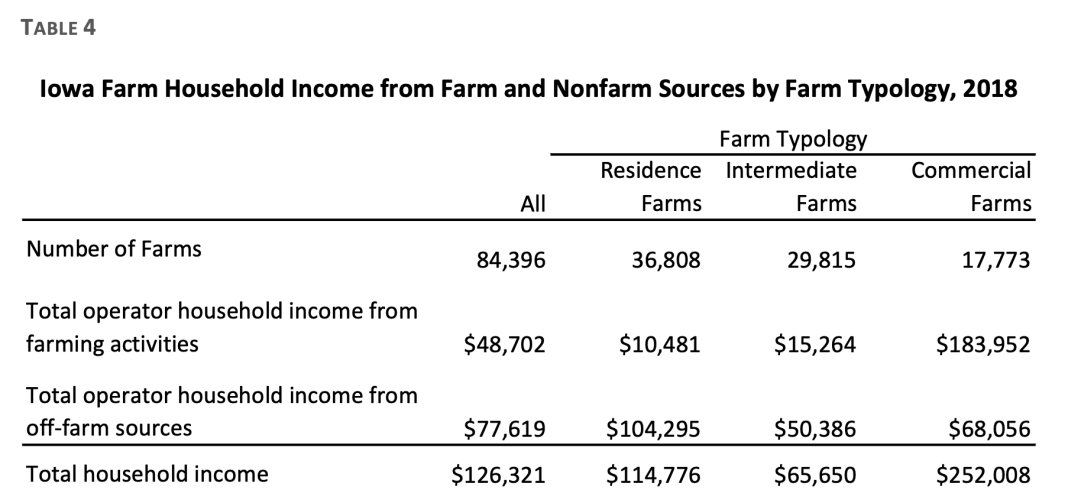Pucky Freak
Well-known member
Two simple things that are bringing about profound changes to land ownership in Iowa.
Farm and recreational property ownership shows an accelerating trend towards nonresident ownership. Large farms are increasingly being purchased by investors for portfolio diversification. Lifelong farm owner-operators do continue to pass along their businesses to family, or another Iowa owner-operator, but these transitions are becoming less common over time. A companion trend is consolidation, in which the median total number of acres farmed by an owner-operator increases continually. Once a farm moves to investor hands, they hire a tenant, and it pretty much never returns to a new owner-operator. When these properties sell, they go to developers, other investors, or existing resident owner-operators enlarging their operation. New owner-operators, excluding inheritance transitions, are an extreme anomaly due to the enormous costs of entry, which well exceed a cool million.
Ag is still big business in Iowa, accounting for 12% of the total economy, and 17% of jobs. 77% of our total surface area is row crops, and 8% is feedlots, grass, pasture, and other crops. The remaining 15% of area breaks down to 8% timber, 4% urban development, 1% water, and 2% all other combined. Farm owner-operators have income and assets significantly above the median, whereas farmers without business assets are economically below average. Ag job salaries excluding operators are significantly below median income. If the land ownership trend described above continue for another generation or two, nonowner-operators will vastly outnumber owner-operators, and the relationship between the land, those who own it, and those who work it might look a lot like the rangelands of the West look today. The rangelands went first, pasturelands and row crops are next. There will always be lucrative ag jobs, and these tend to concentrate in ancillary ag functions such as transportation, biofuels, research, ag science, equipment business, etc.
Recreational properties are a much smaller slice of the IA landscape, but they are experiencing similar ownership trends. NR’s flush with capital or credit purchase smaller recreational properties for hunting, and other uses. According to some realtors I’ve talked to, nonresident interest in recreational property jumped fivefold during COVID. I don’t know if that number has held steady or changed since then, but either way it remains high. Recreational purchases that include tillable land usually result in the new owner renting or leasing those portions.
Nonresident deer hunters make up a significant percentage of recreational property buyers, even though they cannot obtain an either-sex deer tag every year. Unlike any other state, IA has neither nonresident landowner tags, nor nonresident OTC either-sex tags for WT. Nonresident landowners have to draw their tag, which up until recently they could get about every other year. Now it is about once every four years thanks to THP, the Bowmars, the Lakosky’s (yes, Iowa is the “Utah” of the Midwest), and just increased demand overall.
NR landowners have responded by greasing the political wheels to erode barriers to obtaining the highly sought-after either-sex WT tags. In the WT world, IA is the Golden Land, with bucks having both a good age class and giant antlers. Every year at the Statehouse legislators float a series of bills to add NR landowner tags, increase the 6000 NR license quota, and otherwise pave the way forward to get the NR’s with deep pockets their tags. Basic principles of managing a public trust are somewhere between nonexistent and poorly understood.
There are some interesting economic and social considerations associated with opening the floodgates to NR deer hunters. If tomorrow an unlimited # of NR tags were available, existing recreational property owners would see a sharp increase in the value of their land. Sales would overwhelmingly go to NR’s, and those electing to keep their properties could make bank through leasing to NR’s.
It is plausible that within my lifetime I will witness the State complete its transition into a vassal territory of the nonresident wealthy, with residents serving as their tenants. I guess that is the natural outcome of capitalism. Nevertheless, it still feels strange. I have a difficult time imagining a plausible alternative outcome, and I have no idea what it would take for that happen either.
Farm and recreational property ownership shows an accelerating trend towards nonresident ownership. Large farms are increasingly being purchased by investors for portfolio diversification. Lifelong farm owner-operators do continue to pass along their businesses to family, or another Iowa owner-operator, but these transitions are becoming less common over time. A companion trend is consolidation, in which the median total number of acres farmed by an owner-operator increases continually. Once a farm moves to investor hands, they hire a tenant, and it pretty much never returns to a new owner-operator. When these properties sell, they go to developers, other investors, or existing resident owner-operators enlarging their operation. New owner-operators, excluding inheritance transitions, are an extreme anomaly due to the enormous costs of entry, which well exceed a cool million.
Ag is still big business in Iowa, accounting for 12% of the total economy, and 17% of jobs. 77% of our total surface area is row crops, and 8% is feedlots, grass, pasture, and other crops. The remaining 15% of area breaks down to 8% timber, 4% urban development, 1% water, and 2% all other combined. Farm owner-operators have income and assets significantly above the median, whereas farmers without business assets are economically below average. Ag job salaries excluding operators are significantly below median income. If the land ownership trend described above continue for another generation or two, nonowner-operators will vastly outnumber owner-operators, and the relationship between the land, those who own it, and those who work it might look a lot like the rangelands of the West look today. The rangelands went first, pasturelands and row crops are next. There will always be lucrative ag jobs, and these tend to concentrate in ancillary ag functions such as transportation, biofuels, research, ag science, equipment business, etc.
Recreational properties are a much smaller slice of the IA landscape, but they are experiencing similar ownership trends. NR’s flush with capital or credit purchase smaller recreational properties for hunting, and other uses. According to some realtors I’ve talked to, nonresident interest in recreational property jumped fivefold during COVID. I don’t know if that number has held steady or changed since then, but either way it remains high. Recreational purchases that include tillable land usually result in the new owner renting or leasing those portions.
Nonresident deer hunters make up a significant percentage of recreational property buyers, even though they cannot obtain an either-sex deer tag every year. Unlike any other state, IA has neither nonresident landowner tags, nor nonresident OTC either-sex tags for WT. Nonresident landowners have to draw their tag, which up until recently they could get about every other year. Now it is about once every four years thanks to THP, the Bowmars, the Lakosky’s (yes, Iowa is the “Utah” of the Midwest), and just increased demand overall.
NR landowners have responded by greasing the political wheels to erode barriers to obtaining the highly sought-after either-sex WT tags. In the WT world, IA is the Golden Land, with bucks having both a good age class and giant antlers. Every year at the Statehouse legislators float a series of bills to add NR landowner tags, increase the 6000 NR license quota, and otherwise pave the way forward to get the NR’s with deep pockets their tags. Basic principles of managing a public trust are somewhere between nonexistent and poorly understood.
There are some interesting economic and social considerations associated with opening the floodgates to NR deer hunters. If tomorrow an unlimited # of NR tags were available, existing recreational property owners would see a sharp increase in the value of their land. Sales would overwhelmingly go to NR’s, and those electing to keep their properties could make bank through leasing to NR’s.
It is plausible that within my lifetime I will witness the State complete its transition into a vassal territory of the nonresident wealthy, with residents serving as their tenants. I guess that is the natural outcome of capitalism. Nevertheless, it still feels strange. I have a difficult time imagining a plausible alternative outcome, and I have no idea what it would take for that happen either.






